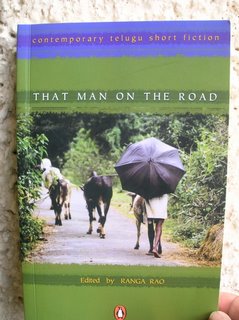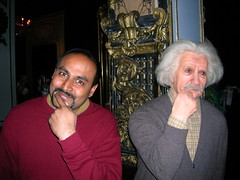Guest post from Arvind -- 1
===========
Practical Philosophy Class I.
The organization
The organization itself is a not for profit organization where every person involved from the instructor to the personnel that staff the cafeteria volunteer their time. The organization was founded in London in 1938 and is dedicated to the spreading of philosophy to all people. At 195 $ the price in New York is probably very nominal considering that they might use this just to cover the cost of real estate.
Some recent news about the organization and the course I am currently doing occurred when Hugh Jackman, the British actor enrolled for this course in London, and later mentioned it on the Oprah Winfrey show as something that changed his life significantly for the better. When I enrolled I did not know about Hugh Jackman, but now I have an interest in this actor as some one whose life path traversed some common point.
The environment
The school was at a very nice part of town, upper east side, one block away from the park. The building itself also doubled as a day school for kids and the day school focused on philosophy as well. The class room was very informal and retained the homely characteristic inherently endowed by the home that was later converted to the school. The building had a nice basement with a book store and a cafeteria. The book selection had a surprisingly large representation from India . Aside from the Vedas and the Upanishads there were a significant number of surprising books such as the Sundara Kandam. There was a section on Economics related books and there was one author, whose book I intend to buy, whose thinking was recommended by Einstein and Shaw as the most relevant thoughts on economic systems. I will be buying the book soon and will write more about this author and his thinking.
The students, teacher and environment of learning.
The teacher was a gentle speaking middle aged man who came to the school as a student many years ago and remains a student taking on other classes here. Since I showed up a couple minutes late, I couldn’t catch his name. When Nandita introduced herself, it became obvious that he knew something about Indian culture and philosophy when he related her name to “ananda” and happiness. Also, he explained that the word wisdom comes from the Sanskrit word “Vid” for knowledge. ( On a side note, simple Indian names for e.g. vidya, janani, bhooma are all increasing beautiful to me.)
Every one had to say why they came to take this class and the categories of answers were ( a ) looking for tools to solve problems with their lives
( b ) understanding themselves (my reason)
( c ) understanding the world and others
( d ) curiosity about what philosophy is (nanditas reason)
( e ) why am I here and what is my purpose and
( f ) my dad signed me up for this.
I couldn’t help feeling, although I hope I am wrong, that those who came for ( a ) and ( c ) will fail without mastering ( b ). So I hope, for their sakes, they are not looking for instant answers. I think ( e ) is an excellent question but one that has been incorrectly answered by all non empiricial philosophers and put to rest by Darwin – easily the greatest philosopher of all time.
One of the dudes, who was volunteering and who I struck up a conversation with asked me what I do was extremely keen on knowing how money can be made on financial markets. This was a complete antithesis to what most people expressed in the class as what they signed up for.
The instruction method
The lesson began with the interesting suggestion to “not accept anything stated right away nor reject anything right away” but to experience it, ponder over it and then act. That was a promising note to begin with.
Early on in the lesson, some of the features of how this course may play out were apparent to me. The instructor was saying that something would be a selfish thing to do and I interjected and observed that he was implicitly passing a value judgement on selfishness. I was earlier expecting that such concepts (selfishness) will be dealt with individually and axiomatically be discussed. However, the instructor was more along the lines of experience it for yourself and you will see that selfishness is not a good thing. At this point some one else interjected and asked if gift giving is a selfish thing if you feel good about it. And some other answers were provided and none of them made any sense to me.
But I think this discussion drove home some features of this course. First, it was not going to be an axiomatic exploration from first principles after a detailed examination of what goes into first principles. The course is going to be “here are some things to think about experience it for yourselves.” So it had a bit of a touchy feely type effect. However, I think the approach has its merits – a wide set of issues are presented and even if you come away with an incomplete understanding of any of them, there is exposure to many things and gradually you may learn to deal with each one of them. The second feature was that this is a people oriented course, designed to make it friendly for people with various view points. There was no rush to bring the discussions on track – the approach was along the lines of all is good, lets not rush, everybody matters. Now, I tend to agree with this feature because If philosophy cannot help us connect with each other and appreciate each other for being fellow travelers on our respective survival journeys what else can. So I began to appreciate the lack of structure. I suppose the attitude to adopt for this course is like the attitude a first time traveler to India has to adopt - with patience and compassion, you can see beauty when you are not expecting to see it. Other wise it’s a really rough ride.
The lesson
The lesson could be thought of as having two parts. The first part encouraged thinking and the second emphasized action in the form of two meditative sessions that were led by the instructor.
One of the themes that we were asked to think about during the course of regular life over the next week was “What would a wise person do in this situation?” The interesting thing about this exercise is that beneath its vagueness lies a great depth of potential. No definition of a “wise man” was given although people were queried for what they thought a wise man was. One dude who had studied philosophy for a while offered an interesting characterization (by no means a definition.) He offered “an intelligent man is one who can find a way out of a difficult situation. A wise man is one who does not get into a difficult situation.” I think the power of this exercise is two fold. If followed properly it forces you to increase awareness of your actions over the week by asking this question before acting. Second by deliberately leaving the definition of a wise man open ended, you are forced to work out for yourself what makes an action wise in a given situation.
The second theme for the week was to think about the following story. A proud leader of a pack (murder?) of crows thought less of the rest because he could fly faster. One day he boasts to a swan that he knows 101 ways of flight and shows each way off to the swan. The swan says he knows just one way and to show that they start flying and the crow initially is very fast and often comes back to the swan and encourages him to fly faster. Eventually the crow tires out and the swan rescues him from death.
I think there a lot happening in this story and will try to write some of it. The first thing to note is that the story is structured so pride takes a fall. So it is kind of a threatening moralizing story – do this stuff and you are in deep shit. I don’t like these kind of morals. However the story is an excellent launch pad for the following types of inquirys. I’ve written down the questions first and then some of my thoughts on them.
What is pride. What conditions are necessary for it to exist. Is pride necessary. In what circumstances is pride beneficial/dis beneficial?
Is it necessary to know many things? (101 ways of flight.) What knowledge is useful and what isn’t?
Pride
======
No man can be proud of himself. Man can only be proud of his image of himself. This idea, which I derived from JK’s teachings, is powerful in recognizing that pride cannot exist without an image of oneself. And by pride we mean the act of admiring attributes of the image of oneself. This image goes by many names “identity” and so on. Pride usually stems from an inability to be happy about oneself and results in one being happy about the image of oneself.
So is pride a “bad” thing? That’s much much trickier to answer than what the story will have you believe. This requires you to have some understanding of what is good. For this discussion, I only need to use one attribute of goodness to illustrate my point. I think any act undertaken by any species for its survival is a good one. So, for example, I would claim that when a cheetah hunts down a deer the actions of both species (attack and defense) are good acts and there is a goodness maximation of sorts in effect during this hunt. (When KFC mass manufactures chicken sandwiches, sorry no goodness there, man can perfectly survive without chicken.) Given my definition of goodness, I can speculate situations where pride can be good unlike what the story leads you to believe. Pride is an extremely useful weapon when man has to fight for survival. In our evolution there have been many points in time where there were not enough resources for all men to survive. Warriors who prided themselves on their art could have survived better than those who took no pride in quality. So yes pride can be a good thing.
Is it necessary to know many things?
================================
Again, in this story an aesthetic principle (do one thing do it well) is falsely represented as a utility maximizing precept (it is more useful to know one thing (the swan survives) well than to know many things.) I personally love the aesthetic idea and have used it well, but I very much doubt its universal utility. (Of course it is not necessary to know anything more than you need to but that is a tautology.)







